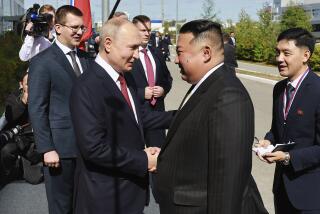N. Korea to Allow Visit by U.S. Envoy
- Share via
SEOUL — North Korean leader Kim Jong Il will reportedly allow an American envoy to visit Pyongyang to address the Bush administration’s concerns that the Communist nation is developing weapons of mass destruction, a South Korean presidential envoy said today.
Envoy Lim Dong Won, returning triumphantly from a three-day summit in Pyongyang, the North’s capital, announced a broad package of concessions from the North Koreans, including another round of reunions for separated families and the resumption of work on severed North-South roads and railroad lines.
Lim said the North had accepted a proposal by South Korean President Kim Dae Jung, a Nobel Peace laureate who has been trying to mediate the stalemate between the United States and North Korea, to invite Bush administration special envoy Jack Pritchard to Pyongyang for talks.
“Chairman Kim Jong Il agreed with the . . . advice that dialogue with the United States is necessary to prevent tensions from rising on the Korean peninsula,” Lim told reporters in Seoul. The North Koreans, he said, “seem well aware of the seriousness of the international situation.”
There was no word on when such a visit would occur, although Lim said that Donald P. Gregg, a former U.S. ambassador to South Korea, would visit Pyongyang this weekend to pave the way for reopening a dialogue with North Korea. Pritchard met twice last month in New York with Pak Gil Yon, North Korea’s ambassador to the United Nations.
Relations between the United States and North Korea have been spiraling downward since President Bush took office last year. They plunged to a new low in January, when Bush named North Korea as part of an “axis of evil,” along with Iran and Iraq.
Although there are no credible allegations linking North Korea to the Sept. 11 terrorist attacks, the Bush administration is concerned that the country is developing nuclear, biological and chemical warheads, as well as missiles that could reach as far as Hawaii and Alaska.
The impoverished regime also supplies missile technology to Iran, Libya, Pakistan and Egypt to raise hard currency, according to a recently declassified CIA report.
North and South Korea released a six-point statement today announcing the family reunions and agreement on the road and railroad construction. There was no mention in the North Korean media of any meetings planned with the United States, although earlier in the week North Korea said it would continue meeting with a U.S.-led consortium building nuclear power plants in North Korea to address power shortages that affect most of the country.
On Friday, North Korea let loose a fresh barrage of colorful anti-American rhetoric, condemning the “brigandish and barbaric nature of the U.S. imperialists who regard aggression and terrorism against other nations as a mode of their existence.”
Among North Korea-watchers, there was some cynicism that the North’s supposed concessions were designed to obscure the controversy over its development of weapons of mass destruction.
“Of course we welcome reunions of separated families and the building of the railroad. This is fine and nice. But it doesn’t solve the real problem, which is weapons of mass destruction,” said Paik Jin Hyun, a North Korea specialist at Seoul National University. He suggested that the North Korean government was trying to be on its best behavior to distract the international community from the weapons issues.
“They have seen what has happened in Afghanistan, what happened in the past to Iraq. Although they talk bravely, they are scared of the Bush administration,” Paik said.
The family reunions agreed to this week will take place April 28 at Mt. Kumgang, a resort on North Korea’s east coast. Additionally, economic cooperation meetings will be held in early May in Seoul, as well as working-level talks over the road and rail connections, the development of an industrial park near the nations’ demilitarized zone and flood protection measures.
For many Koreans, the most important achievement of the summit is the resumption of family reunions after more than a year. South Korean President Kim’s landmark visit to the North two years ago paved the way for three rounds of reunions that involved about 4,800 participants, but squabbling over timing and venues brought things to a standstill.
South Korea has a waiting list of 117,576 people who have applied to participate in the reunions, although about 12% are said to have died since putting their names on the list. Kim Chong Ro, a spokesman for the Unification Ministry, which organizes such events, said applicants are selected for reunions by a lottery, although priority is given to those older than 65.
The spokesman said it is hoped that this round of reunions will be larger than the previous ones.
More to Read
Sign up for Essential California
The most important California stories and recommendations in your inbox every morning.
You may occasionally receive promotional content from the Los Angeles Times.













